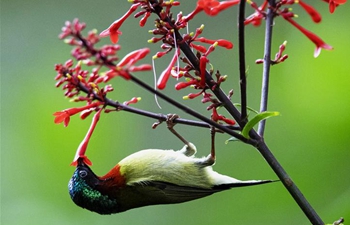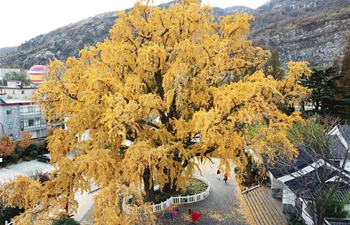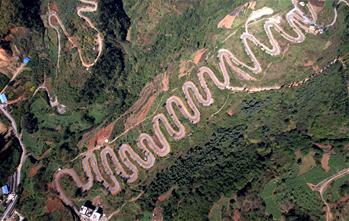
Zhou Jinfeng, secretary general of China Biodiversity Conservation and Green Development Foundation (CBCGDF), speaks during the 14th meeting of the Conference of the Parties to the Convention on Biological Diversity in Sharm El-Sheikh, Egypt, on Nov. 20, 2018. Pangolin conservationists have called for a ban on illegal trade of mammal products during the 14th meeting of the Conference of the Parties to the Convention on Biological Diversity held in Egypt. (Xinhua/Peter Mutai)
by Peter Mutai
SHARM EL-SHEIKH, Egypt, Nov. 20 (Xinhua) -- Pangolin conservationists have called for a ban on illegal trade of mammal products during the 14th meeting of the Conference of the Parties to the Convention on Biological Diversity held in Egypt.
Zhou Jinfeng, secretary general of China Biodiversity Conservation and Green Development Foundation (CBCGDF), told media on Tuesday that pangolins are among the most trafficked mammal species globally, with 20 tons of the animals and their parts are trafficked internationally every year.
The scientist called on governments to set up conservation centers to rescue pangolins from extinction. He said that CBCGDF has set up seven conservation centers in the past two years in China.
Alice Hughes, vice secretary general of CBCGDF, said that pangolin trade is the fourth biggest wildlife illegal trade globally and valued at 20 billion U.S. dollars.
Hughes told governments to raise public awareness to avoid the use and consumption of the mammals.
"There is need to highlight that there is no evidence that the use of pangolins products is medicinal," she added.
Hughes said that despite that the Convention on International Trade in Endangered Species of Wild Fauna and Flora (CITES) listed all eight pangolins in Appendix I on a global scale I 2016, there has been unprecedented levels of illegal trade.
She recommended trainings for border enforcement officers in recognizing Pangolin products to help reduce the trafficking.
Qiao Jia, advocacy officer with African Wildlife Foundation, said that the organization has started training of sniper dogs to help reduce trafficking of wildlife products.
Qiao said that so far sniper dogs are being used to smell pangolin and other wildlife products in Kenyan, Ugandan and Mozambican port of entries.
During its standing committee meeting in October 2018 CITES recommended halting all Pangolin trade and stipulated that no stockpiled pangolin parts should be legally traded internationally.











